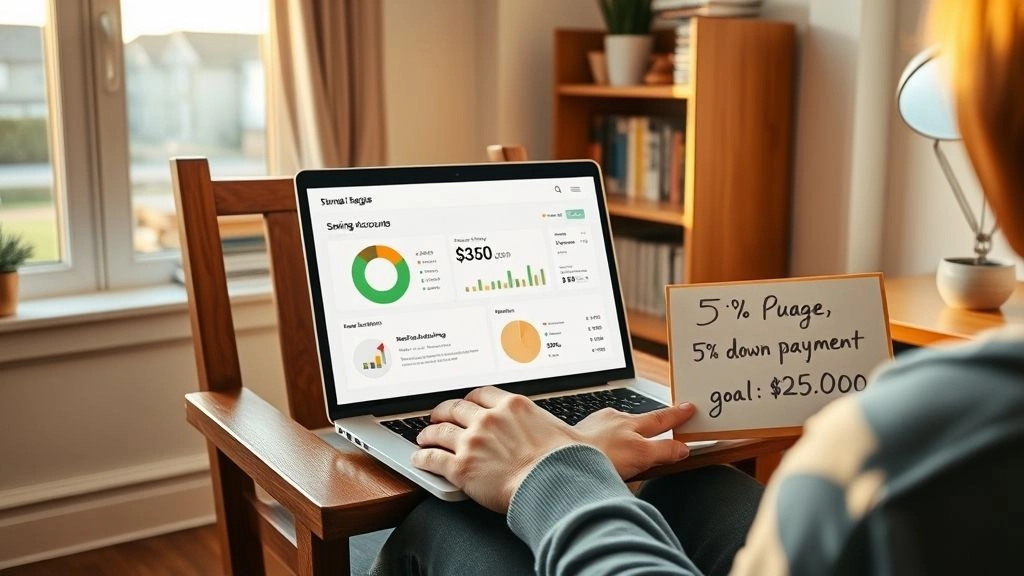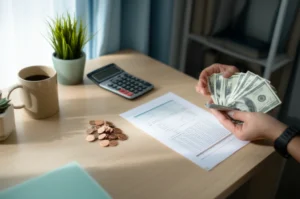Picturing Your Dream Home?
At first, I honestly thought saving for a house down payment… was like trying to catch a unicorn. Just a few years ago, I’d open those real estate apps, sigh, and think, “Well, that’s just for people who skip coffee and never have fun, right?” (Spoiler alert: It’s not.) If you’re feeling like every extra dollar vanishes on rent or groceries, you’re not alone. That’s the feeling most frugal folks start with—and where a lot of amazing saving stories begin.
So, want to actually get those keys in your hand? Maybe you just want to see if can you save for a house while renting is even possible (it is). Let’s break this down in real, slightly-messy, totally honest terms.
How Much Is “Enough”?
What’s The Magic Number?
Have you done that thing… you know, where you type “how to save for a house down payment” into Google and start sweating immediately at the numbers?
Five percent, ten percent, twenty percent? Here’s the short version, for my fellow overthinkers:
| Home Price | Minimum Down Payment | What That Feels Like |
|---|---|---|
| Up to $500,000 | 5% ($25,000 on 500k) | Okay, still a LOT, but not a million dollars |
| $500,000-$1.5 million | 5% of first $500k + 10% above | Sweatier, but not totally impossible |
| $1.5 million+ | 20% or higher | This is the “I found gold” category |
Average house prices where you are may be higher or lower (and let’s be real, looking at Toronto or Vancouver can fry anyone’s optimism). Some folks get by with just 5% and accept higher mortgage insurance fees. Others grind and save for the magic 20%—which drops your monthly payments and cuts out that insurance thing completely according to this breakdown.
Can You Actually Hit That Goal?
It’s easy to let the numbers scare you off (been there). But let’s ask a better question: what can you save every month without breaking your sanity? Maybe $200. Maybe $1,000+ if you live in your parent’s basement and eat nothing but toast. Most of us land somewhere in between.
And if you’re feeling determined (or maybe a little desperate)? You could aim bigger, like trying to learn how to save for a house in 2 years. It’s possible—just a little intense.
Real Talk Example
A friend of mine saved the minimum 5% for a condo… but then got blindsided by monthly insurance costs. Another pal waited, hustled for two more years, and snuck over the 20% line. They’re paying way less every month and—get this—they have enough left for the occasional pizza night. The choice depends on your lifestyle.
Frugal Wins That Don’t Stink
Where’s The Money Hiding?
Ever looked at your spending and thought: “Wait… where does all my paycheque actually go?” It’s those invisible leaks—$7 oat lattes, random subscriptions (do you even remember signing up for that streaming service?), little Target runs “just for toothpaste.” Oops.
Track every dollar for a month. No judgement, no spreadsheet perfection needed—a crumpled notebook works. You’ll spot a few easy wins. Groceries, takeout, buying air fryers you never use—those categories DO add up.
My “Aha” Moment
One month, I actually added up my eating-out habit. It was… let’s just say, embarrassing. Cutting just one extra meal at a restaurant each week easily freed up $60+. I started bringing lunch from home (boring… but my bank account loved me for it). Even better was when I finally googled Tips for saving money on utilities. Turning off the heat one degree, using cold water for laundry—$30/month saved. Felt like finding money in my winter coat pocket.
What About Utilities and Household Stuff?
Yeah, nobody wants to live by candlelight and take ice-cold showers (unless you do… in which case, you’re tougher than me). But simple shifts—LED bulbs, unplugging chargers, fewer long showers—work. My utility bill dropped by 10% just from killing “phantom power” (the stuff sucking energy when plugged in but not used). Check out these extra Tips for saving money on utilities. Even little wins matter when you’re on the frugality grind.
| Expense | What I Used to Pay | What I Pay Now | Yearly Savings |
|---|---|---|---|
| Utilities | $180/month | $140/month | $480 |
| Takeout | $250/month | $80/month | $2,040 |
| Random Subscriptions | $45/month | $7/month | $456 |
Grow That Savings Pile
Can You Boost Income?
Okay… here’s the thing nobody ever wants to say out loud: Budgeting only gets you so far. There’s a ceiling. Sometimes the only way to speed up your “how to save for a house down payment” journey is to earn more.
Lately, a lot of people jump into gig stuff—Uber, food delivery, pet sitting. My neighbor started reselling thrift shop finds. She made enough in a year to cover closing costs—plus some new running shoes. Even small side hustles matter. Maybe that extra $200 goes straight into savings (if you never see it, you never miss it).
Can You Save While Renting?
Short answer? Yes. Slightly longer answer? It’s tough—but doable—and it builds discipline. If you’re thinking, can you save for a house while renting? I’ve seen friends bulk up their down payment by choosing cheaper neighborhoods and finding roommates. Not always glamorous, maybe… but those sacrifices can slice your timeline in half.
Imagine stashing away what you would spend on a mortgage right now. Pretend it’s already your payment—just with you as the bank. It’s weird, but it works. Set up an automatic transfer on payday—out of sight, out of mind, working quietly in your favor.
Savings Accounts That Don’t Suck
Which Ones Make Sense?
This is where a boring acronym can actually be exciting. There are three main tools in Canada:
- RRSP Home Buyers’ Plan: You can borrow up to $60,000 (tax-free!) for a first home, but you have to pay it back within 15 years. Not a free lunch, but a pretty good deal according to government guides.
- TFSA (Tax-Free Savings Account): Put your money in, let it grow, and when you pull it for your house, you keep all the gains. Also great if you freak out whenever the words “tax bill” come up.
- FHSA (First Home Savings Account): The new kid—targeted just for first-time buyers. Up to $8K a year, $40K total—can also be combined with an RRSP for that sweet double dip.
Not sure which is right for you? Use all three if you can. And don’t forget—autopilot is your friend. Set monthly automatic contributions, so you don’t “accidentally” spend it on another wireless speaker.
Example: Fast Track Savings
Let’s get real for a second. Want to know how to save for a house in 2 years? You’ll probably need to make sacrifices (buh-bye fancy vacations), shuffle any windfalls (tax refunds, work bonuses) straight into savings, and maybe hit up your family for gifts—if you’re cool with that. For some, it was a second job; for others, skipping big purchases like cars. But two years can go by fast.
Mindset Shifts (+ Little Joys)
Does Frugality Mean No Fun?
Not if you frame it right. I’m not gonna lie—some days it’s tough. But the little wins? They feel amazing. Hitting a savings milestone equals a massive mood boost. Plus, knowing you’re moving towards “adulting goals” (owning something, maybe even painting a wall purple for no reason) is pretty sweet.
Generosity on the Path
I used to wonder about this: does owning a home—versus renting—change how generous you are with money? Turns out, when you have a bit more ownership in your life, you might find yourself giving back a little more. Maybe it’s home-cooked dinners for friends instead of restaurant outings, offering a place to crash, or even small donations to causes you love.
If you’re curious, peek at explain how renting or buying a home is connected with someone’s ability to be generous?. You might find you’re already pretty generous—just in different ways depending on your living setup. Renting brings more flexibility (and sometimes more anxiety about random landlord texts). Owning builds stability over time, which often opens up opportunities to help others.
| Scenario | Financial Freedom? | Giving Potential |
|---|---|---|
| Renting | High flexibility | May feel pinched by unpredictable costs |
| Owning | Stable foundation, equity grows | More surplus for helping out, over time |
Friendly Wrap-Up (You’re Closer Than You Think)
So let’s be honest: how to save for a house down payment is not about living in total deprivation or turning every Friday into a “no fun” night. It’s about little actions you stack up—habit by habit, week by week—until one day those digits in your savings account look impressive. Make it easy on yourself: cut back where you won’t notice, make saving automatic, use the best account (or accounts) you can, and find a side hustle you don’t completely hate.
And if your brain tells you it’s not possible, scroll back and remind yourself: people have saved up while renting (yes, really—see can you save for a house while renting), learned how to save for a house in 2 years, and even kept their generosity alive (read more at explain how renting or buying a home is connected with someone’s ability to be generous?). Your home won’t save itself—but one small change might start the ball rolling. What will you try first?
Seriously—grab a notebook, jot your “magic number,” decide on a super-easy saving tweak, and get moving. Your future self (and maybe your future dog, or plant collection, or game night crew) will thank you. Here’s to dreaming big without feeling broke. You’ve got this.












